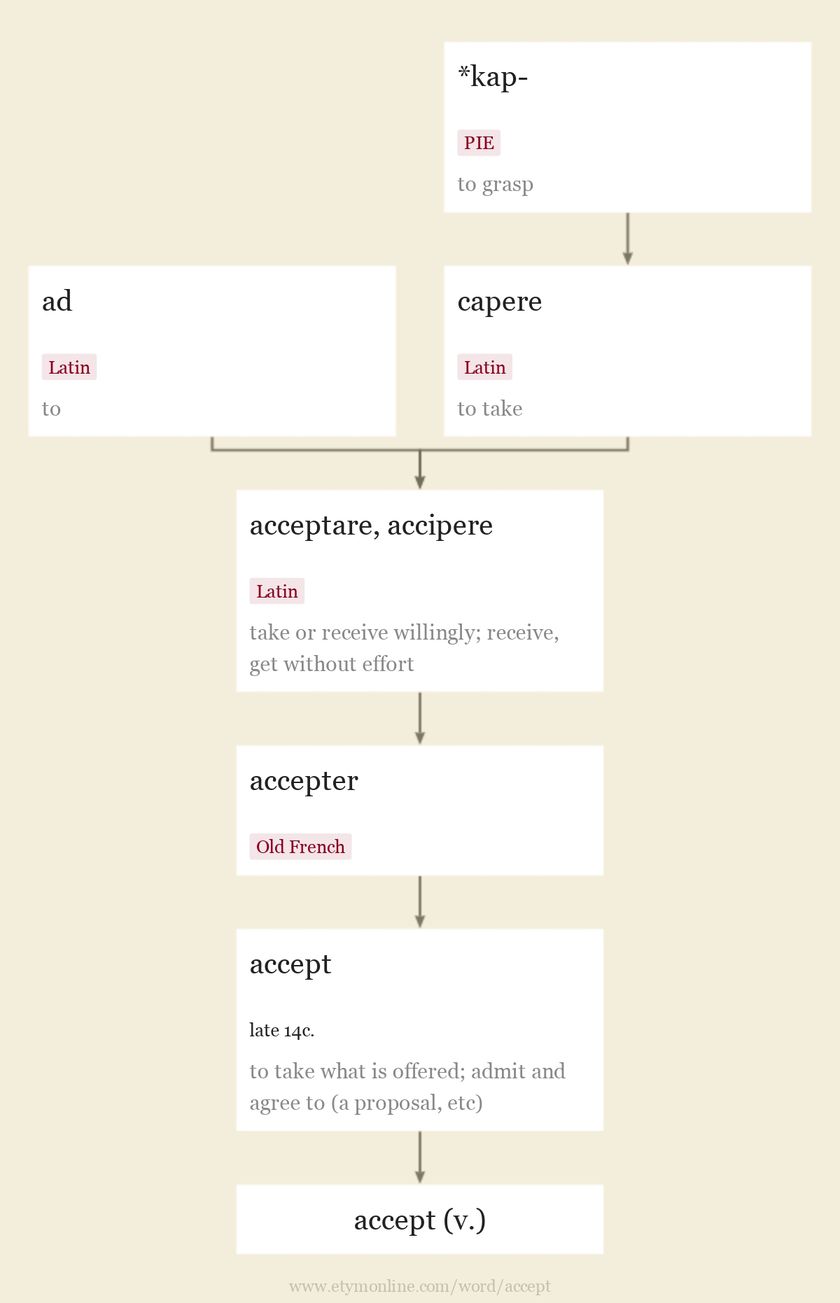accept (v.)
14世纪晚期,“接受所提供的东西; 承认并同意(提议等)”,源自14世纪的古法语 accepter 或直接源自拉丁语 acceptare “愿意接受或收到”,是 accipere “不费力地接收、获得”的频率形式,由 ad “到”(见 ad-)和 capere “拿”(源自 PIE 词根 *kap- “抓住”)组成。相关词汇: Accepted; accepting。

accept 的相关词汇
这个词缀表示方向或附加,源自拉丁语 ad,意为“到,朝向”(空间或时间); 作为前缀时,有时仅仅是强调作用,表示“关于,与...有关”,源自 PIE 词根 *ad-,意为“到,靠近,于...之间”。
在 sc- 、sp- 和 st- 之前,简化为 a-; 在许多辅音前改为 ac-,然后根据后面的辅音重新拼写为 af- 、ag- 、al- 等(如 affection 、aggression)。还可以参考 ap-(1)。
在古法语中,所有情况下都缩写为 a-(这种演变在梅洛文吉安拉丁语中已经开始),但法语在14世纪重新塑造了其书写形式,效仿拉丁模式,英语在15世纪也从古法语中学习了这种方式。在许多情况下,发音也随之改变。
在中世纪末期,法语和英语的过度纠正“恢复”了一些从未有过的单词的 -d- 或重复辅音(如 accursed 、afford)。在英格兰,这个过程比在法国更进一步(在法国,方言有时会抵制这种学究式的语言),导致了英语中的 adjourn 、advance 、address 、advertisement(现代法语为 ajourner 、avancer 、adresser 、avertissement)。在现代的词汇构成中,有时认为 ad- 和 ab- 是相反的,但这在古典拉丁语中并不是这样。
原始印欧语根词,意为“抓住”。
它构成或部分构成以下单词: accept; anticipate; anticipation; behave; behoof; behoove; cable; cacciatore; caitiff; capable; capacious; capacity; capias; capiche; capstan; caption; captious; captivate; captive; captor; capture; case (n.2) “容器”; catch; catchpoll; cater; chase (n.1) “狩猎”; chase (v.) “追逐,狩猎”; chasse; chasseur; conceive; cop (v.) “抓住,捕捉”; copper (n.2) “警察”; deceive; emancipate; except; forceps; gaffe; haft; have; hawk (n.); heave; heavy; heft; incapacity; inception; incipient; intercept; intussusception; manciple; municipal; occupy; participation; perceive; precept; prince; purchase; receive; recipe; recover; recuperate; sashay; susceptible。
它是以下单词的假设来源/其存在的证据由以下单词提供:梵语 kapati “两把手”; 希腊语 kaptein “吞咽,狼吞虎咽”, kope “桨,把手”; 拉丁语 capax “能够容纳很多,宽广的”, capistrum “缰绳”, capere “抓住,握住; 足够大; 理解”; 拉脱维亚语 kampiu “抓住”; 古爱尔兰语 cacht “女仆”,字面意思是“俘虏”; 威尔士语 caeth “俘虏,奴隶”; 哥特语 haban “拥有,持有”; 古英语 hæft “手柄”, habban “拥有,持有”。
- acceptability
- acceptable
- acceptance
- accipiter